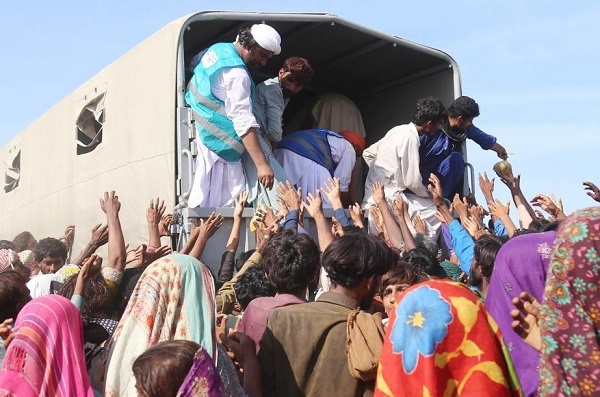Islamabad, (Asian independent) Amid the destructive monsoon rainfall and unprecedented levels of flooding, the afflicted women in Pakistan continue to face difficulties in maintaining menstrual health and hygiene.
The aftermath of the monsoon rains have affected 33 million people during the floods. According to United Nations Population Fund (UNFPA), there are at least 1.6 million women, females and young girls, who critically require menstrual health aid.
These women also include about 650,000 pregnant females who are due in September 2022, and are currently in need of immediate maternal health and reproductive services.
Among all the necessary items being distributed at flood-hit areas, menstrual hygiene kits have been neglected considering it as not so essential relief aid product, which threatens health and hygiene conditions including the risk of water and vector borne diseases.
Therefore, not ignoring this essential necessity of women and breaking all the society taboos two young girls took this initiative to ensure provision of menstrual health products to the flood affected females.
Working effectively on the ground and ensuring rapid access to essential health services to the flood affected females, Anum Khalid, a university student of Bahauddin Zakariya University Multan and her online friend Bushra Mahnoor, who is also a student of University of Punjab in Lahore, initiated a social media campaign called “Mahwari Justice”, primarily focused on collecting menstrual products and funds to be provided to women and children of the flood affected areas across Pakistan.
“In 2010, I was only 10 years old when the floods hit Pakistan. As I am originally from Attock city, there were many areas in our surrounding that were hit by the floods. I went there with my parents to provide relief aids. There me and my mother saw a girl whose shalwar (pants) had blood marks. My mother took her into the tent and found out that her periods had started and she had nothing to handle it,” narrated Bushra Mahnoor as she talked about how she and her online friend Anum felt the need to start Mahwari Justice campaign.
“Then this year, when these floods are even worse than that of 2010, I got a call from a woman from Lasbela in Balochistan. She said in this dreadful condition in a tent her periods have started and she has nothing but a plant leaf to use as a pad,” added Bushra.
This call from Lasbela forced both long distance friends Anum and Bushra, to raise the seriousness of the matter and campaign through social media.
“Mahwari Justice Campaign has provided MHM kits to at least 12,000 people. The kit is a package that also has a pictorial description of how to use the pads for even illiterate females to see and understand,” said Anum Khalid.
MHM kits are the basic health necessities for those who menstruate. “We are hoping to increase the outreach to at least 50,000 more females,” said Bushra Mahnoor.
From being trolled on social media to breaking the stereotypes, Anum Khalid and Bushra Mahnoor face multiple challenges on a daily basis for raising voice on female menstrual health, they are criticized by predominantly females on social media, who lash out at them for talking about what they take as a very private matter for females in the name of modernisation, which has for decades, kept within the females herself.
Unfortunately, menstrual health is not part of any NGO’s policy, it is an uneasy thing to be associated with for other organisations and when we requested a reputed company (menstrual pads manufacturing company) to donate us and support us with menstrual pads; we were donated 150 pads and were asked to buy pads from them, said Anum Khalid.
But despite having such serious challenges of societal neglect, criticism and outright neglect, Anum and Bushra are adamant to not lost their focus on what their target is.. which is to provide menstrual relief aid to females in flood affected areas, who are suffering to menstrual hygiene related issues.
“Periods do not stop during floods. Women need assistance and we will make sure that they get it at the earliest,” said Anum Khalid.








